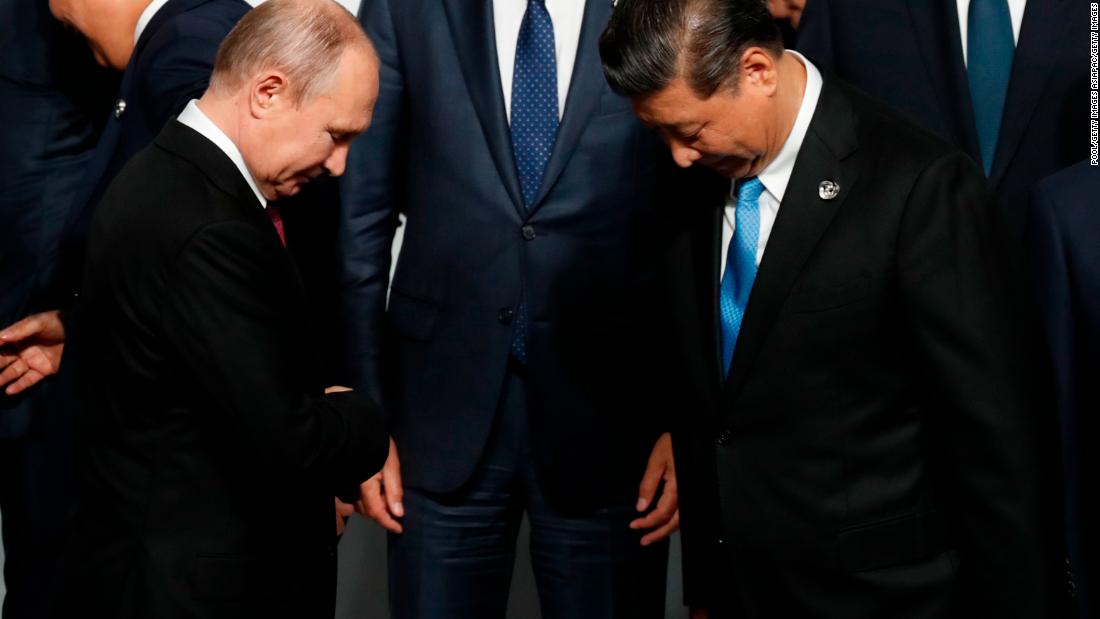[ad_1]
It is no coincidence that Putin and Xi have cemented their grip on cherished goals, as the clock runs down on Trump’s first, and possibly only, term in office.
This past week, in a referendum on constitutional revisions so predictable that copies were on sale before the vote, Putin has effectively been made President for life, as Xi has moved equally ruthlessly, taking control of Hong Kong through a new national security law, while telling US allies Canada, Australia and the UK to keep out of China’s internal affairs.
Both seem to be of the view the US has neither the will nor the consistency to put up resistance. Indeed, Trump’s White House gave evidence of exactly that this week, floundering for a coherent response to allegations Russia paid the Taliban to kill US forces in Afghanistan. The Russian Embassy in Washington and the Taliban have both denied the claims.
As David Ignatius wrote in The Washington Post this week, Putin “is in the payback business. He believes the United States destroyed his former country, the Soviet Union. He likes the United States to feel pain.” He now has plenty of years for more payback.
According to White House deputy press secretary Sarah Matthews: “President Trump is a world-class negotiator who has consistently furthered America’s interests on the world stage.”
Former senior US officials provided CNN contributor Carl Bernstein with a very different take. They thought Trump “delusional” about his ability to bend other leaders to his agenda, believing he could “either charm, jawbone or bully almost any foreign leader into capitulating to his will.”
Whether it’s Putin’s payback or Xi’s decision to violate and chip away at the Hong Kong agreement signed with the UK in 1984, both leaders appear to see opportunities.
Go back three years. Russian Foreign Minister Sergey Lavrov dropped into the Oval Office the day after Trump fired James Comey as FBI director. Comey was overseeing the investigation into allegations of Russian election meddling. An official Russian photographer caught the bonhomie, as Trump told his visitors: “I just fired the head of the FBI. He was crazy, a real nut job.”
Two months later, Trump met Putin — alone — on the margins of the G20 summit. The White House trumpeted the encounter as a success, highlighting a new ceasefire deal in Syria. The Russians cynically used the deal to freeze the conflict, allowing the Assad regime backed by Russia to pick off rebel-held areas one-by-one.
Trump could have protested, ripped up the deal, forged a new US policy on Syria that would have crimped Russia’s growing influence in the Middle East. Instead he bought the lie.
It would be a recurring theme. Trump’s former national security adviser John Bolton recalls in his new book “The Room Where It Happened” Trump’s 2018 meeting with Putin in Helsinki, Finland.
“Putin had to be laughing uproariously at what he had gotten away with,” writes Bolton, after Trump accepted Putin’s assurances there had been no Russian interference in the 2016 US campaign.
So fast forward to this year as Putin, in power for 20 years, needed a constitutional fix to hold on for longer. He appears to calculate that despite tightened US sanctions over his invasion of Ukraine, and the poisoning of exiled former agent Sergei Skripal in the UK, Trump won’t push back for what he does at home.
He was right. He is now effectively President for life, hoping to emulate Soviet leaders by stepping down only into his grave.
Xi’s experience with Trump has been different. Tangled in a trade war, he has had to calculate Trump’s real intent: on money, human rights issues, such as the Uyghurs or Hong Kong, and simply stopping the rise of the world’s next superpower.
At a large and raucous Beijing business dinner two years ago, I sat next to a former Chinese ambassador. The trade war was just beginning to ramp up, but tariffs on solar panels, washing machines, steel, soybeans and aluminum were already biting into China’s bottom line.
The diplomat, who had spent many years in Europe, told me in very precise terms that Trump was intentionally preventing China taking its rightful place in the world as a high-tech advanced economy.
I can be sure of what he’d say now as the Trump administration tries to persuade allies not to allow Huawei’s 5G technology into their digital bloodstream.
But those allies are less willing to say no, partly because of China’s commercial power but also because their relationships with the US have frayed.
Only this week German Chancellor Angela Merkel, who Bernstein’s sources say was berated by Trump in phone calls, appeared to reject Trump’s China tactics, saying “only together can the 27 EU member countries have enough weight to achieve ambitious deals with China.”
While Trump has been applauded for confronting China on its trade policies, commercial espionage and intellectual property theft, his tactics face heavy criticism.
All of this will have been in Xi’s calculations about Trump, whether he is an existential threat to China’s rise to be the world’s superpower, or a prelude to a smarter adversary with the same goal.
Xi appears to have hedged toward the latter, choosing to act now against Hong Kong’s determined pro-democracy movement, and pushing the narrative that the West is behind it, before it became a real thorn in his side.
Hong Kong’s new National Security Law, promulgated in Beijing this week and immediately enforced on the territory’s streets, is a game changer. According to the UK, it breaks the 1984 joint Sino-British declaration of one country-two systems.
The question historians may well debate in the future is not whether Trump’s presidency affected Putin’s and Xi’s decisions but by how much his delusions changed the world in their favor.
[ad_2]
Source link






